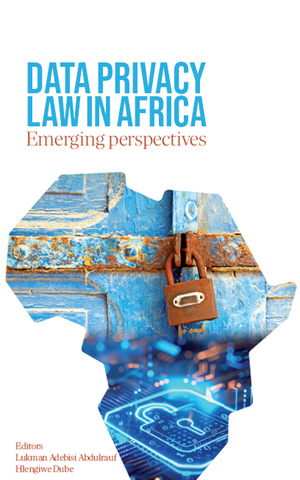Data privacy law in Africa: Emerging perspectives
Editors: Lukman Adebisi Abdulrauf & Hlengiwe Dube
2024
ISBN: 978-1-7764485-9-3
Pages: 383
Print version: Available
Electronic version: Free PDF: Available
About the publication
Data privacy law in Africa: Emerging perspectives delves into the profound impact of data privacy on individuals, businesses, and governments across the continent. Experts from diverse African nations provide a comprehensive view of the evolving regulatory frameworks guiding data privacy, exploring its legal, social, economic, and cultural implications. Examining emerging contexts such as Artificial Intelligence, vulnerable groups, and the challenges presented by COVID-19, the book sheds light on the present and envisions future trajectories in data governance. A valuable resource for those navigating the intricate intersection of law and technology in Africa, offering innovative solutions and best practices for enhanced data privacy.
Table of Contents
Foreword
Contributors
Introduction
Lukman Adebisi Abdulrauf and Hlengiwe Dube
Part I: The status of data privacy in Africa
Part II: Data privacy and artificial intelligence
Part III: Data privacy and vulnerable groups
Part IV: Data privacy during the COVID-19 pandemic
Part V: Selected data privacy issues from a comparative perspective
PART I: The status of data privacy in Africa
Chapter 1: A quest for an African concept of privacy
Patricia Boshe
1 Introduction
2 African privacy: Does it really matter?
3 Privacy in data protection
4 A myth about African privacy
5 African privacy: A way forward
6 Conclusion
Chapter 2: Data privacy in Africa: Taking stock of its development after two decades
Alex Boniface Makulilo
1 Introduction
2 The African world view on privacy
3 Determinants of privacy concerns in Africa
4 Policy and regulatory frameworks for privacy and data protection
5 Analysis of data privacy policies in Africa: Patterns and trends
6 Conclusion
Chapter 3: An old question in a new domain: Some preliminary insights on balancing the right to privacy and freedom of expression in the digital era under the African human rights law
Yohannes Eneyew Ayalew
1 Introduction
2 Internet freedom under the African human rights law
3 Balancing the right to privacy and freedom of expression: Preliminary insights
4 Publication of personal information
5 The right to be forgotten
6 Conclusion
PART II: Data privacy and artifical intelligence
Chapter 4: The ascent of artificial intelligence in Africa: Bridging innovation and data protection
Emmanuel Salami
1 Introduction
2 An overview of relevant concepts
3 Actual deployments of artificial intelligence in Africa
4 How do artificial intelligence systems collect (personal) data?
5 Data protection concerns and remedies in the deployment of artificial intelligence in Africa
6 Some implications of inadequate data protection law regulations for artificial intelligence systems
7 Conclusion
Chapter 5: African data protection laws and artificial intelligence – regulation, policy and ways forward
Moritz Hennemann
1 Introduction
2 African data protection laws and artificial intelligence: The current state
3 A comparative look at the European Union and the GDPR
4 Balancing innovation and potential risks: The way forward
5 Conclusion
PART III: Data privacy and vulnerable groups
Chapter 6: Digital vulnerabilities and the privacy conundrum for children in the digital age: Lessons for Africa
Hlengiwe Dube
1 Introduction
2 Digital risks encountered by children in the digital age
3 Privacy implications of children’s interaction with technology in Africa
4 Children’s actions that compromise their privacy
5 Emerging technologies and processing children’s personal information
6 Existing frameworks in Africa for children’s privacy and child protection online
7 Lessons for Africa
8 Conclusion and key recommendations
9 Conclusion
1 Introduction
2 Conceptual framework and approach
3 Context
4 Gendered harms from AI-based systems
5 A gender-responsive policy action and the role of civil society towards privacy
Chapter 8: Data protection and privacy for social assistance beneficiaries: A South African perspective
Ntando Ncamane
1 Introduction
2 Regulation of social assistance
3 Regulatory framework to protect data and privacy of beneficiaries
4 Challenges
5 Recommendations
6 Conclusion
PART IV: Data privacy during the COVID-19 pandemic
Chapter 9: Tracking COVID-19: What are the implications for data privacy in Africa?
Alex Boniface Makulilo, Rindstone Bilabamu Ezekiel, Doreen Mwamlangala and Mbiki Msumi
1 Introduction
2 COVID-19 contact tracing and modern technology
3 Privacy concerns and debates around COVID-19
4 COVID-19 and privacy regulation
5 Conclusion
Chapter 10: Can we trust Big Brother? A critique of data protection measures in South Africa’s COVID-19 tracing database
Dusty-Lee Donnelly
1 Introduction
2 Government response to COVID-19 293
3 Protection of personal information
4 Location monitoring and the public interest exemption
5 Future COVID-19 research
6 Conclusion
PART V: Selected data privacy issues from a comparative perspective
1 Introduction
2 Conceptualising and differentiating automated decision making from profiling
3 Exploring the extent of regulation under GDPR and POPIA
4 Contextualising current regulation in an age of big data and ambient intelligence
5 Conclusion
Chapter 12: Independence of data protection authorities in Africa: Trends and challenges
Lukman Adebisi Abdulrauf
1 Introduction
2 International influence on the conceptualisation of ‘independence’ of DPAs
3 Independence of DPAs in Africa
4 Trends and challenges towards ‘independence’ of DPAs in Africa
5 Conclusion
